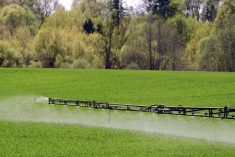Pork producers in the United States, Australia and New Zealand urged their governments on Tuesday to push for an end to Canadian pork subsidies as Canada enters into talks on an Asia-Pacific free trade agreement.
"Canada needs to end its federal and provincial hog subsidy programs, which are distorting the North American and world pork markets," R.C. Hunt, president of the National Pork Producers Council, said in a statement with industry leaders from the two South Pacific countries.
The action came as the 13th round of negotiations on the proposed Trans-Pacific Partnership (TPP) wrapped up in San Diego and the White House formally informed Congress that Canada would be joining future talks on the pact.
Read Also

Alberta crop conditions improve: report
Varied precipitation and warm temperatures were generally beneficial for crop development across Alberta during the week ended July 8, according to the latest provincial crop report released July 11.
"On behalf of President Obama, I am pleased to notify Congress that we intend to include Canada in the ongoing negotiations of the Trans-Pacific Partnership agreement," U.S. Trade Representative Ron Kirk said in a letter.
Because of tough issues ranging from proposed rules on the activities of state-owned enterprises to increased protections for workers and the environment, many trade policy specialists do not expect the TPP talks to finish until sometime in 2013.
Carol Guthrie, a spokeswoman for Kirk’s office, said negotiators made significant progress this week in San Diego in a number of areas, including customs, cross-border services, telecommunications, government procurement, competition policy, and cooperation and trade capacity building.
Countries also set dates for a 14th round of talks in early September in Leesburg, Virginia, she said.
The U.S., Australian and New Zealand pork groups acknowledged domestic farm subsidy programs are not usually addressed by free trade pacts.
"However, in this case, Canadian agricultural subsidies are so wide-ranging and have such a broad and far-reaching impact on overseas markets it is on these grounds we, along with the U.S. and New Zealand, urge the TPP negotiators and governments to deal with these issues fairly as part of the process," Andrew Spencer, CEO of Australian Pork Limited, said.
"Doesn’t make sense"
U.S. hog groups raised similar concerns about Canadian hog subsidies seven or eight years ago, and the U.S. Department of Commerce determined they were not countervailable, said Martin Rice, executive director of the Canadian Pork Council.
Since then, Canada’s share of the world pork market has declined as Canadian hog production dropped for several years due to a strong Canadian dollar and high feed costs, he said.
"(The U.S.) has sustained their production, we’ve cut ours back, so it just doesn’t make any sense, this allegation that we’re having some distorting effect on the world market."
Both Mexico and Canada were invited into the negotiations last month by the nine TPP countries: the U.S., Australia, New Zealand, Chile, Peru, Singapore, Malaysia, Vietnam and Brunei.
It is longstanding U.S. practice for the White House to formally notify Congress before entering into actual trade negotiations with any country.
Kirk sent a letter to Congress on Monday notifying of the administration’s intention to include Mexico in the TPP pact.
Canada has long been the United States’ largest trading partner, ahead of China and Mexico. Last year, two-way goods trade totaled nearly US$600 billion.
Mexico and Canada are already free trade partners with the U.S. under the North American Free Trade Agreement, which went into effect in 1994.
In his letter, Kirk touted Canada’s entry into the TPP as opportunity to update that 18-year-old pact with a "cutting-edge agreement… that will further enhance our trade relationship and benefit U.S. workers, manufacturers, service supplies, farmers, ranchers, small businesses and consumers."
— Doug Palmer writes for Reuters from Washington, D.C. Additional reporting for Reuters by Rod Nickel in Winnipeg.
Related stories:
Trans-Pacific traders ready to add Canada at table, June 19, 2012
Supply management not in ‘dress code’ for TPP club: N.Z., Nov. 24, 2011














